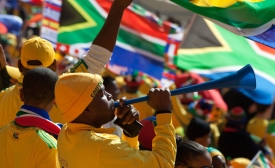world cup
Now that Qatar is embroiled in controversy with nearly the entire Sunni Islamic world, led by Saudi Arabia, the 2022 FIFA World Cup is suddenly at risk. The Qatar World Cup has been dogged by controversy since the day it was announced in 2012. But even years of international and humanitarian moral outrage could not do to Qatar what Saudi Arabia proved able to do almost instantly: isolate Qatar’s ruling emir and take away his biggest soft-power achievement.
One way for North Americans to transcend the ugliness of politics and assert a shared identity would be by hosting a World Cup together. The 2026 World Cup is the next one to be awarded, and the North American region is a strong contender, given the tournament’s traditional rotation among continents. Both Mexico and the U.S. are expected to submit compelling bids.
Last October, President Xi visited the National Football Museum during his state visit to the UK. Moore recounted the cultural exchange: “I gave to the President as a gift from the National Football Museum a copy of the hand- written laws from 1863, and he gave me a gift of a replica Cuju ball.”
As Chinese New Year is celebrated across the globe, it is increasingly clear that the 2015-16 transfer window, closed in Europe but still open in China, marks the emergence onto the world stage of a major new football superpower.
When consumers think about brands, they often think about products. But people and nations are brands too. In fact, some of the world’s most successful business and political leaders have clear personal brands- think of Professor Wangari Maathai, Nelson Mandela and Mahatma Gandhi. They had strong personal brands, which reflected their philosophies and beliefs and aligned strongly with their values. Their brands enhanced their leadership status in the society.

Rook Campbell on the pitfalls of sport diplomacy.
DOHA, June 1 (Reuters) - "It will blow over" tends to be Qatar's unofficial response to criticism of its World Cup bid, but with a FIFA corruption scandal exploding onto the world's front pages, the Gulf state has glumly realised it may have a real fight on its hands. Super-rich Qatar would suffer no economic pain if it lost the right to host the world's top soccer event. At stake is influence, including its use of sport as a platform to operate on the global stage, opening doors to finance, media, diplomacy, property and tourism.
While Qatar may be winning rounds in international organizations and associations, it is failing in part as result of continued criticism of its labour system to achieve its public diplomacy goals associated with World Cup.







